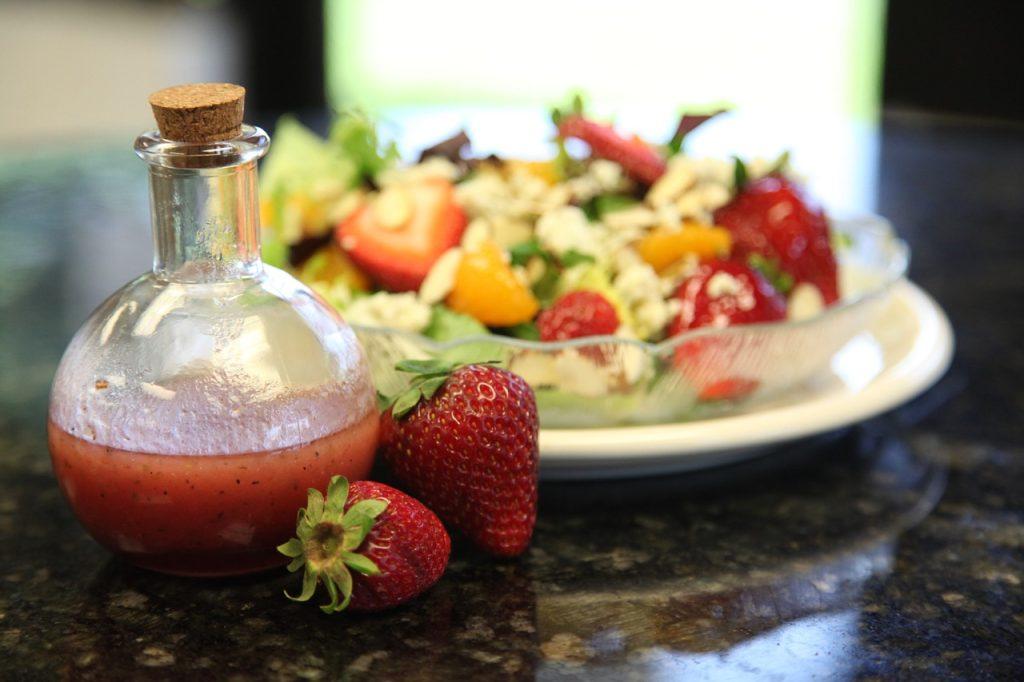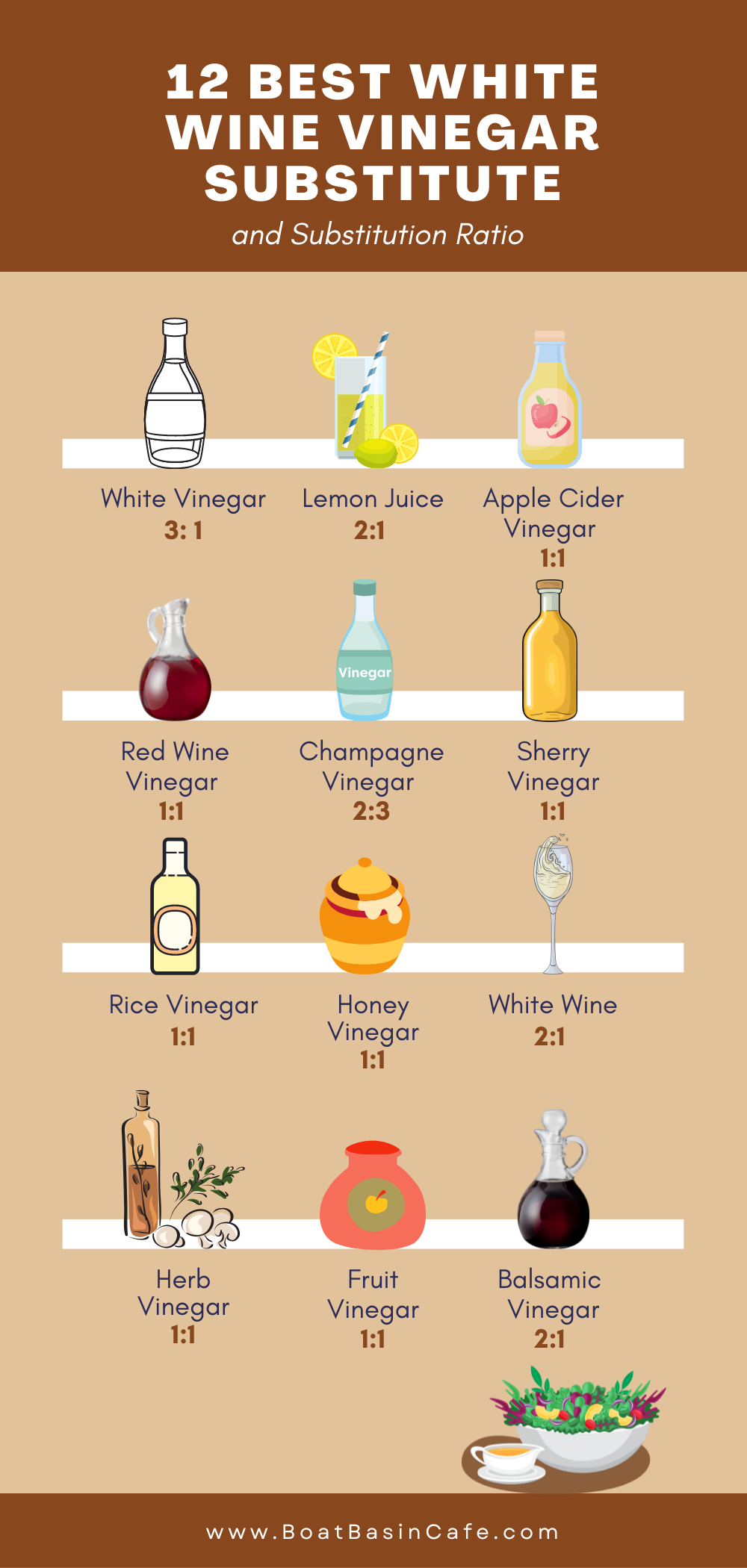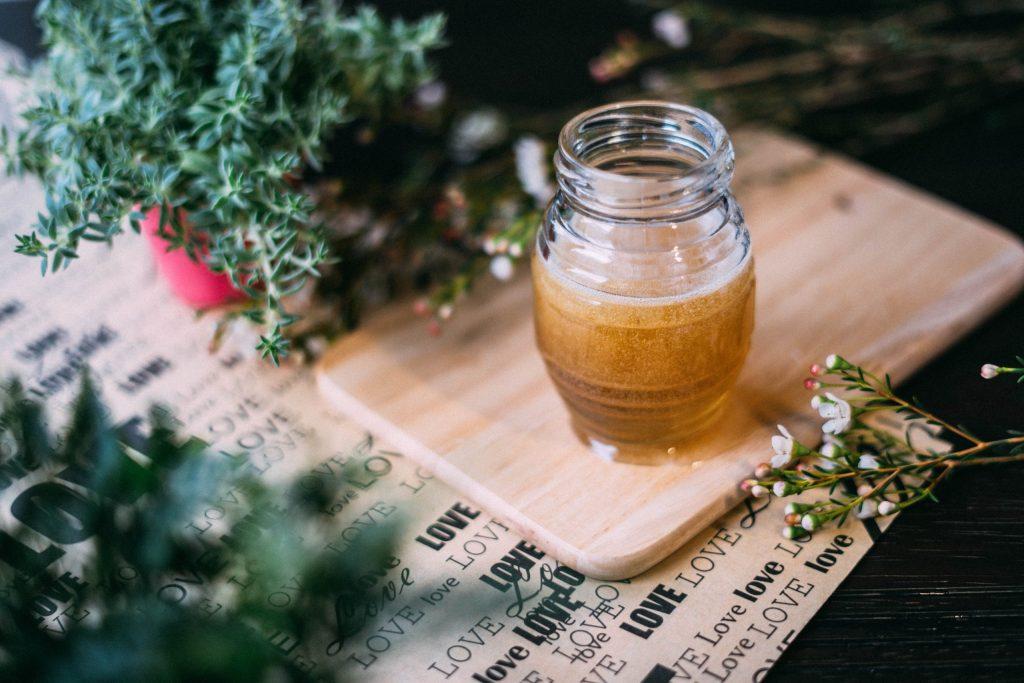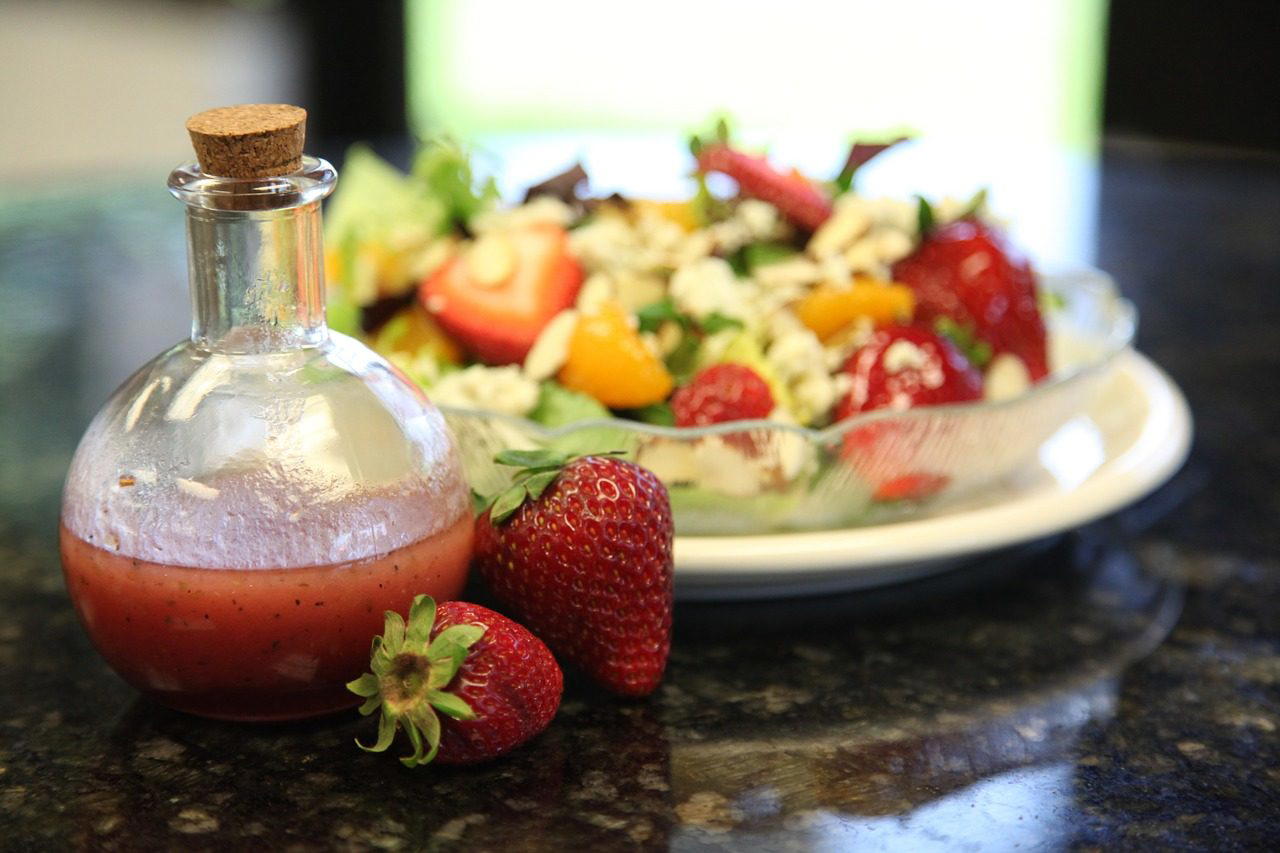
Has it ever happened to you that just when you were about to splash some white wine vinegar in a salad dressing, you found the bottle empty?
Next time you find yourself in the same situation, you can substitute white wine vinegar with one of these closest substitutes without compromising on the overall taste.
Read on to find out!
You may also like: 10 AMAZING Substitutes for White Wine That You Can Use in Your Recipe: The Complete Review
What is White Wine Vinegar?
When white wine is left to ferment and its compound – ethanol- reacts with oxygen, it turns into an acid. Stainless steel vats are used in the fermentation process.
This acid is then diluted with water to retain 5 – 7% of its acidity. The resulting white wine vinegar has light and fruity notes to it.
White wine vinegar is mostly used in salad dressings, vinaigrette, and sauces like hollandaise and bearnaise.
Following is a list of alternatives to white wine vinegar and in what ratio to substitute them (white wine vinegar: substitute). For example, for 3 parts of white wine vinegar, use 1 part of white vinegar.

1. White Vinegar
White vinegar is a common ingredient for household and kitchen cleaning and also serves as a white wine vinegar alternative.
However, don’t be fooled by the same clear appearance. Distilled white vinegar is made from grain alcohol and has a stronger flavor profile than white wine vinegar. It’s also different in that it misses the fruity undertone of the white wine vinegar.
As a result, you need to be a bit careful when using white vinegar. To take the acidic bite out, you should add some water and sugar to it before using it as a substitution for white wine vinegar.
Just add a pinch of sugar to 3 parts of white vinegar and 1 part of water and mix well.
It contains no calories and various acetic acid’s health benefits, which may support weight loss and blood sugar control. However, it lacks certain nutrients present in other vinegars.
However, it’s okay to use white vinegar in equal parts for brining or pickling.
2. Lemon Juice
When no other vinegar is at hand, lemon juice is your best bet! Although it matches white wine vinegar in acidity and tanginess, the flavor would still be citrusy.
Substitute white wine vinegar for lemon juice in a 2:1 ratio to tone down the zesty flavor. For example, if your recipe asks you to use 2 tablespoons of white wine vinegar, use 1 tablespoon of lemon juice and add another half tablespoon of water to it.
Lemon juice is the perfect substitution for white wine vinegar in vinaigrettes and light dishes made from white fish or chicken.
It’s rich in vitamin C and other antioxidants. It can enhance heart health, encourages better digestion, maintains healthy complexion and boosts the immune system.
So, if you’re wondering what you can substitute for white vinegar, there’s always lemon juice!
3. Apple Cider Vinegar
You can easily replace white wine vinegar with apple cider vinegar as they share the same fruity and acidic profile. The mildly sour tones in both are great for a 1:1 substitution in fish or chicken marinades, salad dressings, or any dish that requires some fruity and tangy undertones.
Known for its weight loss properties, it can also lower blood sugar levels and improve diabetes. It’s packed with enzymes and beneficial bacteria from the fermentation process.
However, the flavor of apple cider vinegar is bolder than white wine vinegar. That’s why we recommend you start by using half of the amount required and adjust according to your taste.
4. Red Wine Vinegar
Although both red and white wine are made from grapes, their tastes differ due to the different types of grapes used for each.
Red wine vinegar has a robust fruity and tangy flavor whereas white wine vinegar has a more delicate and subtle tone. That’s why it’s better to use red wine vinegar for red meat dishes and salads that call for a full-bodied flavor.
On the other hand, white wine vinegar is best for light vinaigrettes and white fish and poultry recipes.
While you can use white wine vinegar for hollandaise sauce or salad dressing without batting an eyelid, using red wine vinegar as a substitute here will change the color of the sauce or dressing. So, use caution if you don’t want to turn your white sauce pink!
It also has potential health benefits, including lowering blood sugar levels, improving digestion, and promoting weight management.
If you do decide to go ahead and use red wine vinegar, remember to use the same amount of it as you would use white wine vinegar.
5. Champagne Vinegar
With a mild flavor, Champagne vinegar doesn’t pack the same acidic punch as white wine vinegar. Although its flavor is mild, it’s hard to differentiate and can be an alternative to white wine vinegar.
It’s better to use a higher ratio of Champagne vinegar to make up for the subdued flavor and acidic taste. For 2 tablespoons of white wine vinegar, use 3 tablespoons of Champagne vinegar for the best results.
While it has a lower acidity level, it has similar digestion and weight management benefits as other vinegars.
6. Sherry Vinegar
Sherry vinegar is mostly used in Spanish cuisine and tastes slightly sweet and has a hint of fruity tone. Its flavor is quite pronounced when compared to white wine vinegar.
But, with a similar acidic profile, it makes a great substitute for white wine vinegar in a simple 1:1 ratio.
Known for its antioxidant properties, it improves digestion and likely supports gut health due to its probiotic content.
However, sherry vinegar is darker in color and you may not like to use it if you’re making a white sauce.
7. Rice Vinegar
Rice vinegar or rice wine vinegar is made by fermenting black, white, or brown rice. Both have similar flavors and look the same, so they work as great substitutes for each other.
Although rice vinegar is mainly used in Asian dishes, you can use it in any cuisine and for all types of salad dressings, pickling, and marinades.
Substitute regular rice vinegar for white wine vinegar in an easy 1:1 ratio. However, steer clear from using seasoned rice vinegar as it’s loaded with salt and sugar and will change the flavor and taste of your dish significantly.
It is high in amino acids and healthy organic acids, which aids digestion, inhibits the absorption of fat, helps maintain blood sugar control, and promotes cardiovascular health.
8. Honey Vinegar
If you’re someone who likes to buy specialty food items and store them, you just might have a bottle of honey vinegar in your cupboard.
Fun Fact: Honey vinegar is popular in Romania, Spain, France, and Italy.
The basic ingredients of honey vinegar are honey and water. The solution goes through a long process of fermentation, inoculation with acetobacter, and finally oxidization. The entire process takes about two years.
You can substitute honey vinegar for white wine vinegar in a 1:1 ratio. However, keep in mind that honey vinegar tends to become darker in color over the passage of time. So, just check the color before adding it to your recipe.
Other than that, because of a similar flavor profile, honey vinegar won’t affect the taste of your salad dressing or any other dish.
With antimicrobial properties from honey, it aids digestion, eases coughs and cold symptoms and can help manage diabetes.
Honey and vinegar are both good for your health on their own. And when they are found together in honey vinegar, you get the best of both worlds. Check out the health benefits of honey vinegar below.

9. White Wine
A bottle of white can be easily found in your wine cellar or kitchen cabinet. After all, white wine vinegar is made from white wine, so the base can be the perfect white wine vinegar substitute.
However, all kinds of vinegar have a higher acid content than wine, and therefore, using white wine could result in less of a tangy taste than what you were aiming for.
While it lacks the probiotic content of vinegars, moderate white wine consumption can offer various health benefits like improved heart health.
That’s why we recommend you use white wine to white wine vinegar in a 2:1 ratio. For example, if you’re supposed to use a tablespoon of white wine vinegar, use 2 tablespoons of white wine as an alternative.
10. Herb Vinegar

You can buy herb vinegar from a farmer’s market or make your own version at home using white wine vinegar or distilled white vinegar, garlic, and herbs of your choice.
Herbs like oregano, thyme, rosemary, basil, or tarragon are used to make herb vinegar. These add a mild flavor to the vinegar and are good for using in summer salads as a dressing or for chicken, turkey, and fish marinades.
The health benefits would depend on the herbs used, but generally, it aids digestion, improves skin health, offers stress relief, and has potential anti-inflammatory properties.
A 1:1 ratio of herb vinegar as white wine vinegar substitute works great. You may want to use less amount of seasoning in the main dish as the herb vinegar will add its own flavor and taste.
11. Fruit Vinegar
Well, apple is not the only fruit used to make vinegar. Lemon and berry variations are also there to give a fruity and zesty twist to the plain old white vinegar.
Even plum, peach, mango, papaya, and other fruits are used to produce fruit vinegar.
A fruity vinegar can perk up the taste and flavor of salads, fish, and meat dishes. With the same acidic profile, you can easily replace white wine vinegar with fruit vinegar in a 1:1 ratio.
With a variety of vitamins and minerals, antioxidant and digestive benefits depend on the specific fruit used.
Did you know that besides enhancing taste and flavor to salads, fruit vinegar has health benefits too? Here are the top three benefits!

12. Balsamic Vinegar
Although there’s some debate over using balsamic vinegar as a substitute for white wine vinegar (and for good reasons too), you can still use it if you’re adventurous.
Remember that balsamic vinegar has a heavy body and is sweeter and bolder compared to white wine vinegar. So, instead of using it in vinaigrettes and salad dressings, you can add it to meat marinades for a rich, full-bodied result.
It can improve skin health, reduce acid reflux, reduce hypertension, and regulate blood sugar levels. Use it sparingly due to its higher sugar content.
Just to be on the safe side, start by adding half the amount the recipe requires. Therefore, use white wine vinegar as an alternative to balsamic vinegar in a 2:1 ratio.
Factors to Consider When Choosing the Best Substitute for White Wine Vinegar
The three most important factors to consider when choosing the best white wine vinegar substitutes are
- Acidity level
- Flavor
- Color
To get the alternative to match closest to flavor, acidity, and color, go for rice vinegar, honey vinegar, or Champagne vinegar.
For a full-bodied flavor and acidity, choose red wine or sherry vinegar.
For a savory or fruity flavor, pick a herb or fruit vinegar.
Remember that you can replace white wine vinegar with any other option in this article. Just be mindful of the fact that your dish or vinaigrette dressing may have a slightly different flavor and color.
Final Thoughts
Substitute white wine vinegar with any other vinegar you have at hand to be as adventurous and as experimental as you want in your culinary arts.
Create variations in your dishes and salad dressings by adding different alternatives to white wine vinegar. You just might land upon completely unexpected flavors and be pleasantly surprised.
If you don’t try, you won’t know!
FAQs
1. Can I substitute white wine vinegar for dry sherry?
Yes, you can use white wine vinegar instead of dry sherry. For 1 cup of dry sherry, substitute with 4 tablespoons of white wine vinegar.
2. Can you substitute white wine vinegar in pavlova?
Apple cider vinegar or cream of tartar or lemon juice in a 1:1 ratio are good options to use instead of white wine vinegar in pavlova.
3. What’s the alternative to white wine vinegar in meringue?
The alternative for white wine vinegar in meringue is powdered cream of tartar or apple cider vinegar or lemon juice. For 2 teaspoons of vinegar, use 1 teaspoon of cream of tartar.
4. Is there any alternative to white wine vinegar in baking?
Yes, instead of white wine vinegar, you can use apple cider vinegar in baking.
5. How do you substitute white wine vinegar hollandaise?
Use lemon juice in equal parts to replace white wine vinegar in Hollandaise sauce.
6. What can you use instead of white wine vinegar?
Rice wine vinegar, honey vinegar, Champagne vinegar, apple cider vinegar, lemon juice, white vinegar, sherry vinegar, herb vinegar, fruit vinegar, red wine vinegar, balsamic vinegar, or even white wine make good alternatives to white wine vinegar.
7. Can you substitute white wine vinegar for cooking sherry?
Yes, you can use white wine vinegar, apple cider vinegar, and rice wine vinegar instead of cooking sherry.
8. How to substitute white balsamic vinegar?
You can substitute white balsamic vinegar with white wine vinegar or rice vinegar or regular balsamic vinegar (only if you don’t want to have a dark color in your dish).
9. Can I substitute white wine vinegar for sake?
No, you can’t use white wine vinegar as a substitute for sake. If you don’t have sake, use distilled white vinegar, apple cider, balsamic vinegar, white grape juice, rice vinegar, white wine, mirin, dry sherry, or Vermouth as substitutes.
